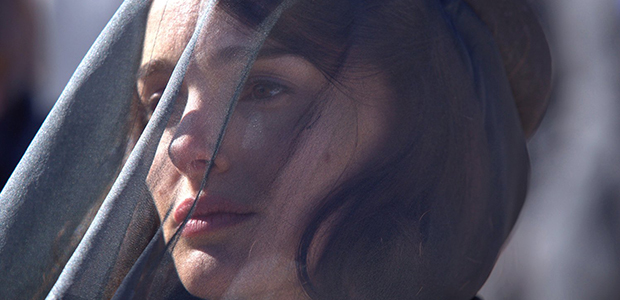It’s rare that we get to see two films from the same director at the same event. The last time this happened at the Dubai International Film Festival was when Steven Soderberg’s masterfully epic Che played during the 2008 edition, but that was in fact one film split into 2 parts. At this year’s festival, we get the rare opportunity to experience two films from upcoming director Pablo Larrain. The first of these was the ingenious Neruda, which had already won us over with its subversive take on the biopic, but now we get Jackie, a chilling, almost haunting account of how the popular first lady dealt with the immediate aftermath of her husband’s assassination, featuring a dazzling central performance by Natalie Portman, who grips the screen from the opening frame, refusing to let go till the end.
Portman is in fact so good that it’s hard to imagine anyone ever attempting to play this role again. She is tasked with an immensely difficult demand – to make us not only believe that she is in fact Jackie Kennedy, but also convince us that the famously private individual did in fact do and say the things we see in this film. This is where Jackie ingeniously uses the privacy of the real life Jacqueline to its advantage – because very little was actually known, except for excerpts of the interview she gave to Life magazine or the images that the public saw, the film creates an entire background to all of this. This also allows Larrain a second opportunity at juxtaposing and then amalgamating fact with imagined fiction, just as he did with Neruda.
Under Larrain’s prying eye, Jackie becomes an enormously intimate portrait of personal grief. The camera follows Portman everywhere till we feel we are viewing something we’re probably not meant to see – vulnerability laid bare during an extremely confused and disorientated period in a person’s life. But Portman isn’t just shown in these defenseless and susceptible states. Her true abilities shine when Jackie is working on her husband’s political myth-making and her over-bearing need to make sure a legacy is left behind. Her firm resolve and determination to do whatever must be done is piercing and precise. The preparations for the funeral, the consultation with a priest, the reliance on her brother in law aren’t just scenes that we witness, we seem to co-exist there while they happen. This approach is at once both inviting and intrusive and the imagery, building on iconic moments from those tumultuous few days, is recreated with a documentarians precision aided in no small part by Mica Levi’s unsettling score.
The film covers just a few days in the life of its titular character but it is densely packaged, going through an enormous amount of detail. An aura of dread overpowers the films tone with only the occasional bursts of recalled happiness in the few flashbacks, resulting in a pressing immediacy. This is not a film you should watch to feel good or be entertained. Don’t look for a plot either. Jackie is entirely about an event and the performance that brings this to life is an achingly raw embodiment of personal anguish.
Rating: 




